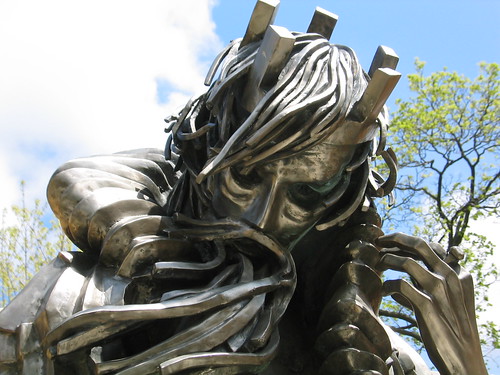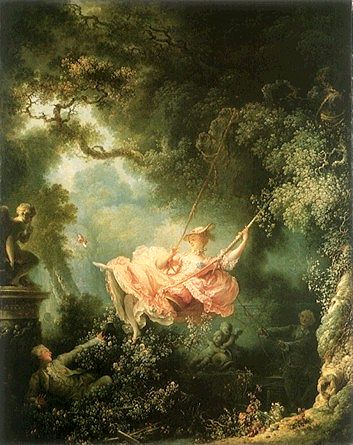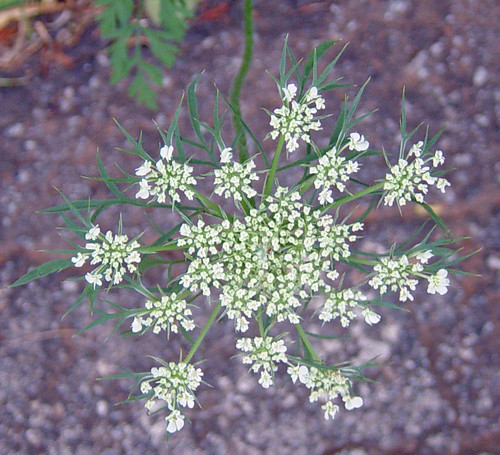Comment insightfully and specifically about Waiting for Godot and about your peers' responses to the play. You may comment all at once or over the course of the week. The comment period will be closed whenever at midnight on Friday, April 4.
Consider writing about the style and form of the play. Consider the minimalist structure. Consider the language.
Consider the stage directions. Consider the label "tragicomedy". Consider the play's relationship to vaudeville comedy. Consider the play's relationship to Theatre of the Absurd.
Consider the play's allusions to Christianity and Christian figures (God-ot, Christ, the thieves, Adam, Cain, Abel, etc.) and to other literature (especially but not exclusively Hamlet).
Consider writing about themes: hope and hopelessness, repetition and variation, sense and senselessness, power and powerlessness, masters and slaves, fate and choice, isolation and connection, waiting and acting (as in action but also as in playing), staying and going, being and not being, and so on.
Consider Samuel Beckett's treatment of the themes in Godot in relation to other author's treatment of the themes in other works you have read and studied.
Consider versions of the scenes from the play in the video bar or explore YouTube on your own. There's a lot there. (Aside: in a professional production of the play that uses Beckett's own production notes, Godot is pronounced GAW-doh and not gud-OH, and Pozzo is pronounced POT-zo not PO-zo. Thought you might be curious.)
Consider your own reaction to the play and explore the reasons for this reaction by remembering our reading of it and by examining the text. Also, push yourself to go beyond your initial reaction.
The best responses will respond to issues we have already discussed and will open up new ground for discussion.
Your response (or responses) should be at least 300 words in length.
Sunday, March 30, 2008
Wednesday, March 19, 2008
King Lear/Kind Leer Final Thoughts
Final Work
1. Post again in the thread of comments below. Explore themes. Discuss literary techniques. Quote the text. Make connections to other works of literature. Respond to peers and to ideas from class. Be as thoughtful, insightful, and specific as you would be in a thesis driven paper but allow yourself to be a bit more open and exploratory. (300 words or so.) Due Friday, March 21 by B-block.
2. Write a personal essay on an aspect of King Lear. Start with a quotation. Start with a character. Start with a relationship. Start with an image. Start with a scene. Then reflect on the meaning of this aspect of King Lear in your own life. Be thoughtful. Be specific. Invent an engaging narrative voice and an appropriate essay structure. Observe standard American English writing conventions. I want you to use this essay as an opportunity to fine-tune your sense of composition (a.k.a organization) and your use of language (a.k.a. stylistic resourcefulness and observation of conventions). (600 words or so.) Complete workshop draft due Wednesday, March 26. Final draft due Monday, March 31.
1. Post again in the thread of comments below. Explore themes. Discuss literary techniques. Quote the text. Make connections to other works of literature. Respond to peers and to ideas from class. Be as thoughtful, insightful, and specific as you would be in a thesis driven paper but allow yourself to be a bit more open and exploratory. (300 words or so.) Due Friday, March 21 by B-block.
2. Write a personal essay on an aspect of King Lear. Start with a quotation. Start with a character. Start with a relationship. Start with an image. Start with a scene. Then reflect on the meaning of this aspect of King Lear in your own life. Be thoughtful. Be specific. Invent an engaging narrative voice and an appropriate essay structure. Observe standard American English writing conventions. I want you to use this essay as an opportunity to fine-tune your sense of composition (a.k.a organization) and your use of language (a.k.a. stylistic resourcefulness and observation of conventions). (600 words or so.) Complete workshop draft due Wednesday, March 26. Final draft due Monday, March 31.
Saturday, March 15, 2008
King Lear Acts Four and Five
For your final posts on King Lear I'd like for you all to engage in an "open but guided forum".
So, comment on whatever aspects of the play interest you: characters and characterization, plot and plot design, motifs and themes, imagery and figurative language, poetic form (blank verse, rhyming couplets), comparisons to other works we have studied, performances and staging (in the Brian Blessed King Lear that we have been watching or in the clips from the Laurence Olivier King Lear found in this blog's Video Bar). Be specific. Be insightful. Cite specifics. Think of the whole.
Now here comes the "guided" part: Make sure your name (not just your screen name) is at the beginning of your commentary, deal with at least two direct quotations from the play in your commentary (identify the quotation by referring to act, scene, and lines in this manner: act.scene.lines (e.g. 1.2.33-44), respond substantively to at least one peer in your comments meaning: go beyond saying "I like what x said"), and comment at least twice.
I will grade the commentary according to a slightly modified version of the discussion rubric that we used earlier this year.
The comment period will close at the beginning of B-block on Wednesday, March 19. (I changed my mind about the due date to give you some more time and with the expectation that your comments will be of a high quality. And in case you are thinking "why B-block?" that will be my last opportunity to read comments before class on Wednesday.
So, comment on whatever aspects of the play interest you: characters and characterization, plot and plot design, motifs and themes, imagery and figurative language, poetic form (blank verse, rhyming couplets), comparisons to other works we have studied, performances and staging (in the Brian Blessed King Lear that we have been watching or in the clips from the Laurence Olivier King Lear found in this blog's Video Bar). Be specific. Be insightful. Cite specifics. Think of the whole.
Now here comes the "guided" part: Make sure your name (not just your screen name) is at the beginning of your commentary, deal with at least two direct quotations from the play in your commentary (identify the quotation by referring to act, scene, and lines in this manner: act.scene.lines (e.g. 1.2.33-44), respond substantively to at least one peer in your comments meaning: go beyond saying "I like what x said"), and comment at least twice.
I will grade the commentary according to a slightly modified version of the discussion rubric that we used earlier this year.
The comment period will close at the beginning of B-block on Wednesday, March 19. (I changed my mind about the due date to give you some more time and with the expectation that your comments will be of a high quality. And in case you are thinking "why B-block?" that will be my last opportunity to read comments before class on Wednesday.
Monday, March 10, 2008
King Lear Acts Two and Three
Consider the motifs below and more...
sight (eyes, blindness) and other senses (touch, smell {noses}); fools, madness, and wisdom; duty and betrayal; naturalness and unnaturalness; animals and humans; storms and calms; age and youth; parents and children; rank and status; nothingness, loss, nakedness...& self...
Comment on at least two interrelated motifs. Your comments should refer to at least two specific passages (at least one passage for each motif). Demonstrate your understanding of the play so far by linking the motifs and the passages to each other and to the overall events and themes. Again, we're using close attention to small particulars in order to illuminate the whole.
At the beginning of your post include your name, name the motifs, and quote the passages (include act.scene.line). Your insightful well-supported commentary comes next.
These comments are due by the beginning of class (12:00pm) on Thursday, March 13.
sight (eyes, blindness) and other senses (touch, smell {noses}); fools, madness, and wisdom; duty and betrayal; naturalness and unnaturalness; animals and humans; storms and calms; age and youth; parents and children; rank and status; nothingness, loss, nakedness...& self...
Comment on at least two interrelated motifs. Your comments should refer to at least two specific passages (at least one passage for each motif). Demonstrate your understanding of the play so far by linking the motifs and the passages to each other and to the overall events and themes. Again, we're using close attention to small particulars in order to illuminate the whole.
At the beginning of your post include your name, name the motifs, and quote the passages (include act.scene.line). Your insightful well-supported commentary comes next.
These comments are due by the beginning of class (12:00pm) on Thursday, March 13.
Wednesday, March 5, 2008
King Lear Act One
Respond to at least one of the following in the comments box:
The theme of identity (especially change and disguise) in act one
The theme of nature and naturalness in act one
The motif of "nothing[ness]" in act one
The parallels in the plot and subplot in act one
The use of dramatic irony in act one
The dynamic between parents and children, nobility and servants
or something else you've notice in act one
The theme of identity (especially change and disguise) in act one
The theme of nature and naturalness in act one
The motif of "nothing[ness]" in act one
The parallels in the plot and subplot in act one
The use of dramatic irony in act one
The dynamic between parents and children, nobility and servants
or something else you've notice in act one
Subscribe to:
Comments (Atom)







